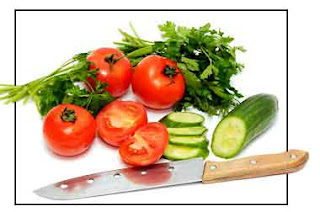 |
| Vegetable Nutrition Facts |
Why should we plant nutrient rich diet?
What are the health benefits of vegetables?
Well
* Vegetables, like fruits are low in fat, but contain good amounts of vitamins and minerals. All green vegetables, yellow and orange are rich in calcium, magnesium, potassium, iron, beta carotene, B vitamins, vitamin C, vitamin A and vitamin K.
* Products such as fruits, vegetables are also home to many anti-oxidants, which are: first, to help protect the body against oxidative stress, diseases and cancers, and secondly to help the body to develop ability to combat this increasing resistance.
* In addition, vegetables contain soluble and insoluble dietary fiber, called non-starch polysaccharides (NSP), such as cellulose, gums, mucilage, pectin ... etc., which absorb excess water in the colon and retain good amount of moisture in the stool, which contributes to its easy passage out of the body. Therefore, useful in diseases such as hemorrhoids, chronic constipation, rectal fissures ... etc
... Go to the green to help you stay fit and healthy!
Plant nutrition has greatly attracted the attention of the consciousness of fitness as well as scientists, as food for its proven health benefits. Many vegetables are very low in calories, like celery, which is even less than 10 calories per 100 g, and here is the long list of plants that is less than 20 calories per 100 grams: pumpkin, bitter melon, cabbage , china, bok choy, eggplant, squash, escarole, spinach, summer, chard, studies, scientists, etc. have shown that low-calorie but nutrient-rich foods, helps the body stay healthy and free of disease.
Also, our body uses a lot of energy during the digestion of food, known as basal metabolic rate or BMR. So think ... .. When you add a power more vegetables in the diet, in fact, set to lose more weight than you will get ... Right! .. The concept behind the "negative calorie foods".
How many vegetables should be in our daily diet?
 |
| Vegetable Nutrition Facts |
Eat at least 5-7 servings of vegetables each day. Seasonal vegetables should be encouraged. Include variations in crop type and color in your diet. Yellow and orange vegetables are rich in vitamin A, α and β carotene, Zea-crypto-xanthine and xanthine, where the dark green vegetables are good source of minerals and flavonoids, phenolic antioxidants.
Selection of vegetables
Whenever possible, opt for organic farming of vegetables for maximum health benefits. Not very expensive if you can find them near the local landowners. Organic truths tend to be smaller, but have a rich flavor and characteristic quantities of vitamins, minerals and full of numerous health benefiting antioxidants.
* There are, however, always buy in small quantities, so they should take a day or two. It makes no sense to eat the green is unfair!
* Buy this feature soft, bright color and taste and feeling of heaviness in his hands.
* Watch for stains, spots, fungus, mold and signs of insect spray. Buy whole vegetables instead of part of them (eg, pumpkin).
 |
| Vegetable Nutrition Facts |
How to use the vegetables?
The first thing you should do immediately after purchase, wash, especially green vegetables. Rinse with salt water for a few minutes and gently swish in cold water until you are satisfied with the cleanliness. This way you can ensure they are free of dust, sand, and traces of chemical sprays. Use them at first, fresh as the first, some vegetables have a very short lifetime and secondly, the beneficial health properties of a vegetable decreases with time. But if you need to save and then put in plastic wrap or bags with zipper to store food for short periods until you use them.
0 comments:
Post a Comment